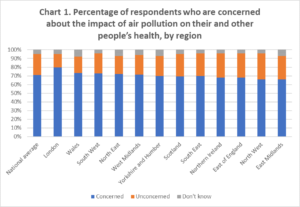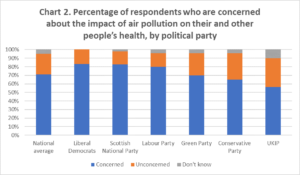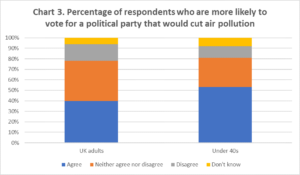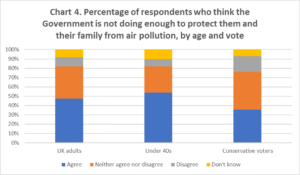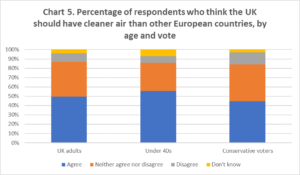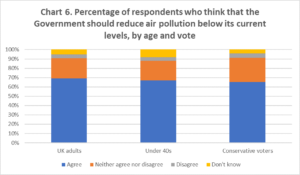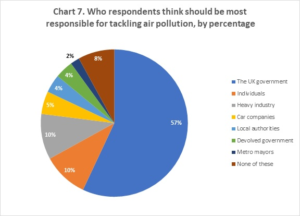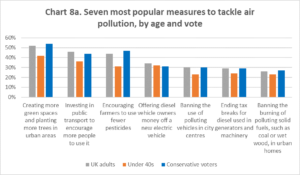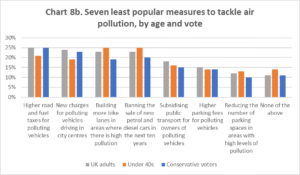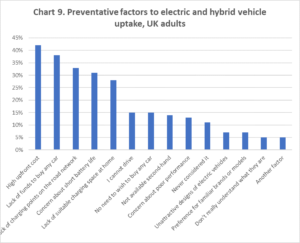The Government has recently renewed its focus on environment policy, influenced in part by recent Bright Blue polling which showed that climate change was the number one policy area which those aged 18-28 years old most wanted senior politicians to discuss more.
Over the past year, the Environment Secretary, the Rt Hon Michael Gove MP, has made a sequence of policy announcements, including on strengthening animal welfare and tackling the scourge of plastic pollution. At the start of 2018, the Rt Hon Theresa May MP, gave the first prime ministerial speech on the environment in over a decade.
One environmental challenge, however, which the Government is still struggling to provide adequate solutions for is air pollution. Air pollution is a problem that is forecast to cause 40,000 premature deaths in the UK a year, and is estimated to cost the economy £1 billion per annum until 2020.
Over the past few years, various Secretaries of State have been subject to numerous court battles – and losses – over their inability to meet air pollution limits set by the European Union. Following another loss in the High Court on air quality earlier this year, the Government released a draft version of its long awaited Clean Air Strategy.
The aims of this new polling are to investigate the levels of public concern about air pollution, attitudes towards the current role and policies of Government on reducing air pollution, and to test a series of policies which the Government may wish to adopt in order to improve Britain’s air quality. The results of the polling will help to inform forthcoming Bright Blue reports on air pollution.
Methodology
Polling was undertaken by insight agency Opinium through online interviews and conducted between 28th February 2018 and 5th March 2018. It consisted of one nationally representative sample of 4,007 UK adults. From this overall sample, we also produced two subsets, each individually weighted. The first was a sample of 1,422 British adults who were Conservative voters in the 2017 General Election. The second was a sample of 1,508 UK adults aged under 40 years old. Each data set (the overall sample and the two subsets) was individually weighted in terms of age, gender, and region to reflect a nationally representative audience.
These datasets enabled us to achieve two goals. First, we were able to quantify public attitudes with regards to air pollution, particularly those who voted for the Conservative Party in the 2017 General Election (whom we will refer to as ‘Conservative voters’) and of UK adults aged under 40 years old. The polling also enabled us to reveal these groups’ views on various policies commonly cited as solutions to tackling air pollution.
We chose to focus on Conservative voters, as the current Conservative Government is unlikely to enact air pollution policies that are unpopular with their supporters. We chose to focus on UK adults under 40 years old in particular, as the Conservative Party performed badly amongst this demographic at the last General Election and is interested in new policies that can increase its appeal with younger voters.
Second, our polling allowed us to analyse the views of UK adults, Conservative voters, and under 40s according to other socio-demographic characteristics including gender, age, socio-economic grade, EU Referendum vote, and others. This helped to reveal any underlying diversity of opinion within Conservative voters and under 40s.
In presenting the results of this polling, respondents’ answers to all questions have been grouped into ‘net’ positive or negative responses. For example, on the question of how concerned respondents were about air pollution, we collated those responses which were ‘very concerned’ and ‘somewhat concerned’ to give a net ‘concerned’ result. The same rule applies to those who are ‘very concerned’ or ‘not at all concerned’ – together, they are ‘unconcerned’.
Concern about air pollution
A significant majority of the British public regard air pollution as a concern for their own health, and the health of other people. As Chart 1 shows, taken as a whole, 71% of the UK population are concerned.
The extent of concern for air pollution is highly dependent on the region a respondent lives in. Concern for air pollution is greatest, perhaps understandably, in London (80%), followed by Wales (74%), the South West (73%), and the North East (72%). The two regions with joint lowest concern for air pollution are the North West and the East Midlands (both 66%). However, it is worth emphasising that even in those areas which are the least concerned about air pollution, still two-thirds of respondents living in them are concerned about it for their and other people’s health.
Concern about the impact of air pollution on health also varies depending on the respondent’s political affiliation, as defined by whichever party they voted for in the 2017 General Election. As Chart 2 shows, Liberal Democrat voters are the most likely to express concern (83%). Interestingly, Green Party voters are over ten percentage points less concerned this, with 70% of them expressing concern. Sixty-five percent of Conservative voters say that they are concerned about the impact of air pollution on health. From these results, it is clear that there are majorities of concern amongst voters of all political parties for the health consequences of air pollution.
A final characteristic with which there is a significance difference in determining how likely a respondent is to express concern about the health impacts of air pollution is how they voted in the 2016 Referendum on Britain’s membership of the European Union. Eighty percent of ‘Remain’ voters say that they are concerned about air pollution, whilst only 65% of ‘Leave’ voters do. Nevertheless, once again, large majorities on each side of the debate expressed concern.
Political impact of air pollution
We wanted to understand how important the issue of air pollution was to voters when deciding on how to cast their vote. We asked respondents whether they would be more likely to vote for a political party that would cut air pollution. Overall, as Chart 3 illustrates, 40% agree that they would.
On this question, age is an important variable. On average, the younger the respondent, the more likely they are to agree. As displayed in Chart 3, under 40s are significantly more likely (53%) to be in agreement than the national average (40%). Examining the data more closely, agreement for the statement falls to 31% amongst 55-64 year olds, and further still to 26% amongst those aged 65+ years old. Conversely, amongst those aged 18-24 years old, a majority (56%) agree that they would be more likely to vote for a political party which would cut air pollution. Amongst 25-34 year olds, this is still a majority opinion at 54%.
With regards to assessing how well the Government is doing in terms of protecting people from dirty air, our polling presented a mixed picture. As Chart 4 shows, almost half of UK adults (47%) agree that current Government action is insufficient. Only 10% believe enough is already being done. Chart 4 also demonstrates that a majority (54%) of under 40 year olds agree that current Government action on air pollution is inadequate.
In addition, even 36% of Conservative voters think that the Government is not doing enough to tackle poor air quality. Compared to Labour voters, this was understandably higher, with 59% believing that current Government action on air pollution is insufficient. Part of this difference in attitudes could be explained by political affiliation, with Conservative voters understandably more positive about the actions of a Conservative government.
Ambition on tackling air pollution
As Chart 5 illustrates, when asked whether they believed that the UK should have cleaner air than other European countries, almost half (49%) of all respondents agreed. Only 9% disagreed.
Interestingly, the idea of the UK having cleaner air than other European countries is particularly popular amongst voters aged under 40 years old. In fact, age is a very important variable: 54% of 18-24 year olds and 56% of 25-34 year olds agree with that statement of ambition, whereas only a minority – albeit a significant one, at 43% – of those aged 55-64 years old do, falling to 43% amongst those aged 65+.
How a respondent voted in the 2017 General Election also brought significant differences in whether they believed the UK should have cleaner air than other European countries. Liberal Democrat voters were the most likely to agree (58%), closely followed by Labour voters (55%). Large minorities of Green Party (49%) and Conservative voters (45%) agree, whilst little over a third of UKIP voters (35%) do.
Similarly, ‘Remain’ voters are more likely than ‘Leave’ voters to agree that the UK should have cleaner air than other European countries, with 56% of the former agreeing compared to 44% of the latter.
On the question of whether or not the UK Government should reduce air pollution below current levels in general, there was more consensus. Over two-thirds (69%) of respondents believe the UK Government should, as shown in Chart 6. Both under 40s (67%) and Conservative voters (66%) agree, meaning they are broadly in line with the national average.
Seventy-eight percent of ‘Remain’ voters agree that Government should reduce air pollution below current levels, compared to 63% of ‘Leave’ voters.
In all regions of the UK, majorities of respondents agree that air pollution should be cut below current levels. This was most pronounced in London, where 77% of its residents think that air pollution levels should be reduced.
Policies to clean up British air
First, we asked respondents who they thought was most responsible for tackling air pollution. A clear answer was given. As can be seen in Chart 7, 57% of respondents think it should be the national UK Government, significantly outranking individuals and heavy industry (both at 10%), and also car companies (5%). Just 4% of UK adults believe that local authorities should be most responsible for tackling air pollution, despite the fact that a lot of responsibility on doing so is currently devolved to local authorities.
However, as our polling only enquired about who respondents think should take primary responsibility for tackling air pollution, this is not to say that they do not believe other actors should be responsible, too.
We then polled respondents on how they would like to see the Government clean up Britain’s air. We chose 14 different policy interventions, based on commonly cited proposals. These were: creating more green spaces and planting more trees in urban areas; investing in public transport to encourage more people to use it; encouraging farmers to use fewer pesticides; offering diesel vehicle owners money off a new electric vehicle; banning the use of polluting vehicles in city centres; ending tax breaks for diesel used in generators and machinery; banning the burning of polluting solid fuels, such as coal or wet wood, in urban homes; higher road and fuel taxes for polluting vehicles; new charges for polluting vehicles driving in city centres; building more bike lanes in areas where there is high pollution; banning the sale of new petrol and diesel cars in the next ten years; subsidising public transport for owners of polluting vehicles; higher parking fees for polluting vehicles; and, reducing the number of parking spaces in areas with high levels of pollution.
From this list, we asked respondents to choose as many as they would support. As Chart 8a shows, the most popular option is creating more green spaces and planting more trees in urban areas, which is backed by a majority of both UK adults (52%), and Conservative voters (54%). Following that, 46% of UK adults say they would support investing in public transport and encouraging more people to use it, and 44% believe that farmers should be encouraged to use fewer pesticides. Interestingly, Conservative voters (47%) are especially keen on this latter policy.
The three least popular options, as illustrated by Chart 8b, however, are: reducing the number of parking spaces in areas with high levels of pollution (12% of UK adults); higher parking fees for polluting vehicles (15% of UK adults); and, subsidising public transport for owners of polluting vehicles (18% of UK adults).
The shift to electric and hybrid vehicles
Vehicular transport is a major contributor to poor air quality in the UK. It is widely believed that a transition towards cleaner vehicles – such as hybrids and electric vehicles – will be necessary if Britain is to properly tackle air pollution. Whilst uptake of such vehicles is steadily increasing, they still occupy only a fraction of the total automotive market in the UK.
There are a number of policies in place to try to incentivise individuals to purchase low-emissions vehicles. In 2017, the Government confirmed that it will end the sale of all new cars and vans which run on conventional petrol and diesel engines by 2040. Other policies include grants worth up to £4,500 being awarded to cars which produce less than 50g/km of carbon dioxide and can travel for at least 70 miles with zero carbon dioxide emissions, and many low-emissions vehicles are also exempt from congestion charging zones, such as the one in central London.
We tested 14 reasons which are commonly cited as barriers to individuals purchasing hybrid and electric vehicles, as shown in Chart 9. We asked respondents to choose all that apply to them. The perceived high upfront cost was the primary concern voiced, being selected as a reason by 42% of respondents. Lack of charging points on the road network (38%) and concerns about short battery life (33%) followed. The factors which are seen as being least preventative for people buying cleaner vehicles are ‘not really understanding what they are’ (5%), unattractive designs (7%), and preference for familiar brands or models (7%).
When analysing the results to this question on a geographic basis we found that the issue of available charging points was far higher for rural respondents. Forty-nine percent express concern about the lack of charging points on the road network (compared to just 28% of urban residents), and 43% express concern about short battery life (compared to 25% of urban residents). Addressing these worries, therefore, may be of paramount importance if hybrid and electric vehicles are to be adopted throughout all parts of the country.
Conclusion
The polling we conducted demonstrates that air pollution is a serious health concern for most people across the UK. A clear majority of people, of all ages and from all parties, regard it as a concern for the health of themselves and their families.
At the same time, almost half of the country believes that the Government is not doing enough to reduce air pollution below current levels, despite a clear majority wanting the Government to do so. Certainly, of all the possible actors responsible for cutting air pollution, the public clearly believe that national government has primary responsibility.
With regards to measures which could be adopted to tackle air pollution, we found that the most popular policy idea would be to create more green spaces and to plant more trees in urban areas. Greater investment in public transport and encouraging farmers to use fewer pesticides were the next most popular policies.
Given the likely role in which they will play in achieving cleaner air, we were also keen to test public attitudes towards hybrid and electric vehicles. The greatest barrier preventing individuals from purchasing such cleaner vehicles were the perceived high upfront costs, lack of charging points on the road network, and concerns about short battery life. Anxiety about the latter two was particularly prominent in rural areas, for obvious reasons. If the Government wanted to accelerate the uptake of less polluting vehicles, these may well be areas on which it might find success in concentrating on.
The Conservative Party has recently redoubled its efforts to appeal to and support younger voters. On the issue of poor air quality, we found that adults aged under 40 were significantly more likely than the rest of the population to believe that the Government is not doing enough to protect them from air pollution, that the UK should have cleaner air than other European countries, and that they would vote for a party which would cut air pollution.
Conservative politicians are of course also mindful of the views of those who vote for them. Whilst it is true that a typical Conservative voter is less likely than the rest of the population to agree that the Government is not doing enough to tackle poor air quality, a majority still agree that the Government should reduce air pollution below its current levels.
The Conservative Government can be confident that acting to reduce air pollution will be attractive to both the younger voters it needs, and its existing voters whose continuing support it depends on.
Eamonn Ives is a Researcher at Bright Blue
Notes
- The full data tables for the general population can be found here, for the under 40s can be found here, and for Conservative voters can be found here
- We gratefully acknowledge the support of the European Climate Foundation for this project
- We are grateful to Opinium for advising on and carrying out the survey, and for their comments on our analysis


